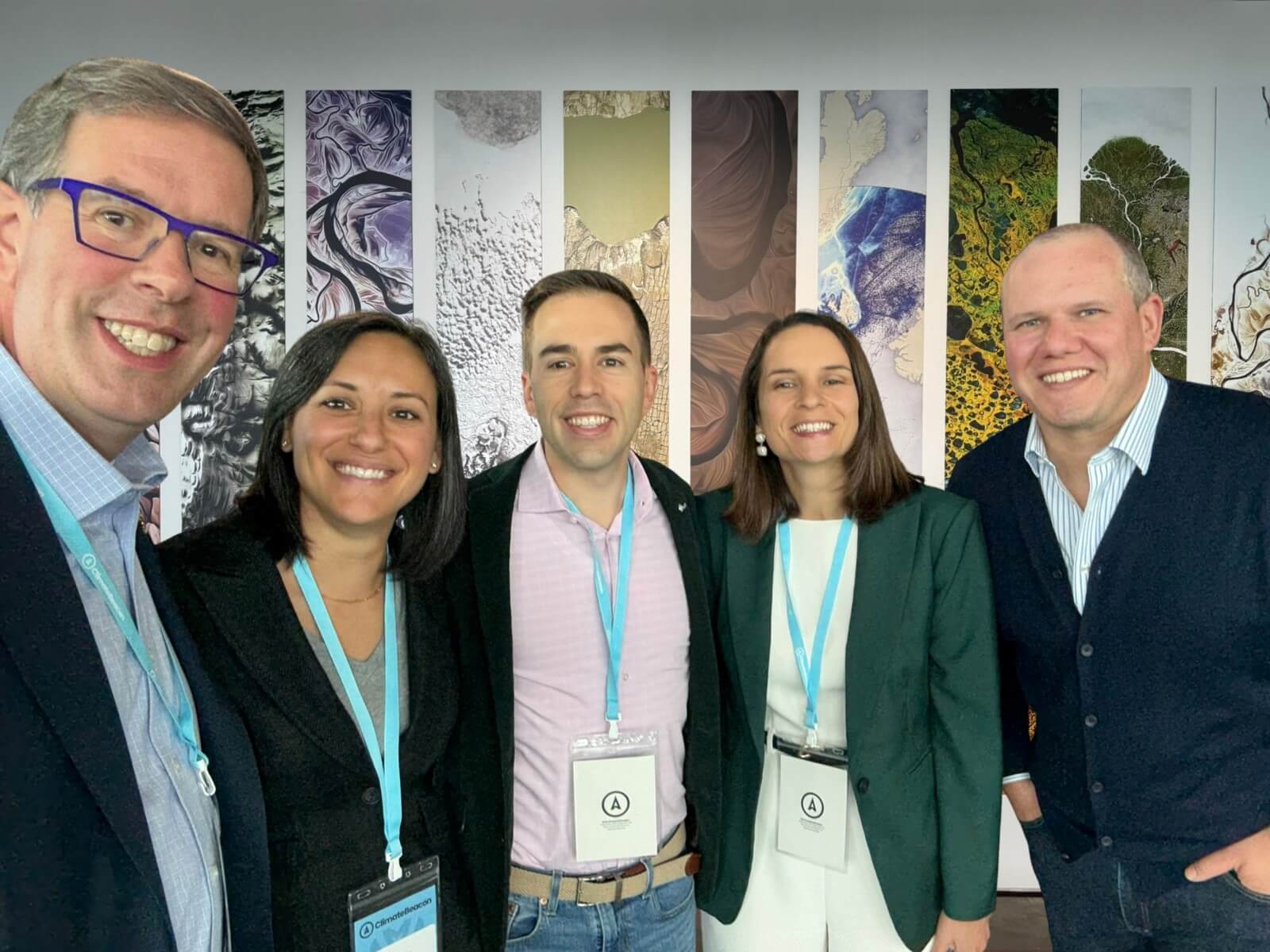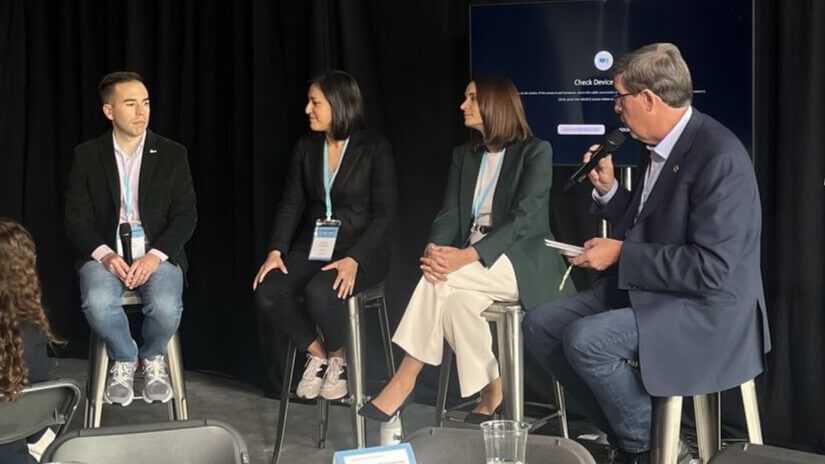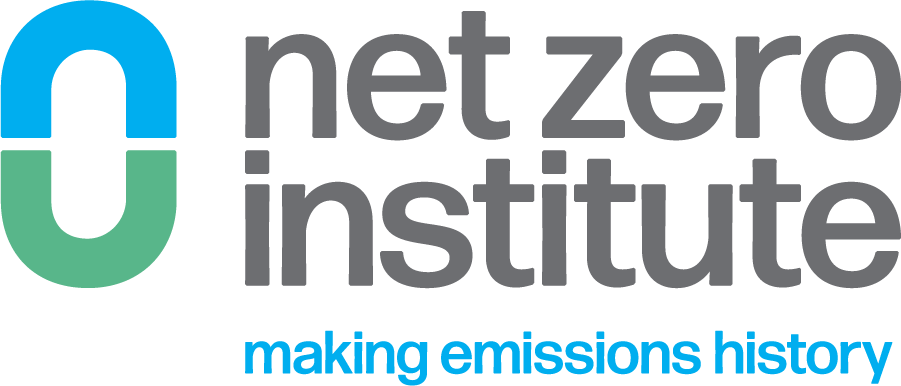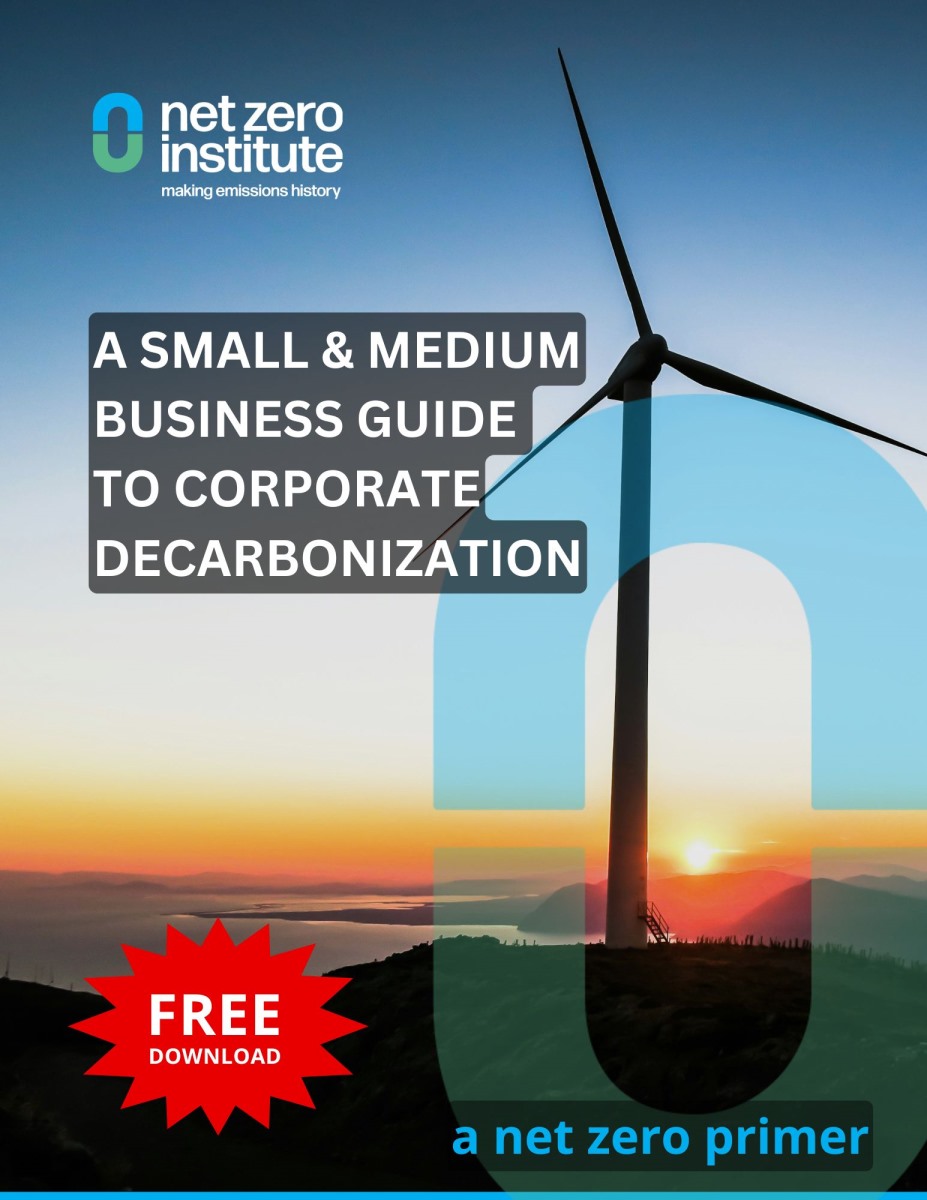Sustainability as a Business Imperative: Driving Value Beyond Compliance

Net Zero Institute President Tom Hopcroft, Former Welch Foods Sustainability Director Nicole Peterson, Akamai Director of Corporate Sustainability and ESG Officer Mike Mattera, Biogen Global Head of Sustainability Katie Woodward, and Climate Beacon Executive Director Alex Richman.
Perspectives from biotech, consumer goods, and information technology show that sustainability isn't just good for the planet, it's good for your bottom line.
What if your biggest sustainability investment wasn't an expense, but rather your most profitable operational efficiency play? What if the practices keeping you competitive with Gen Z consumers were the same ones cutting millions from your cost of goods sold (COGS)?
At the Net Zero Institute, we see a clear pattern emerging across the business landscape. Some leaders remain unaware or uncaring of the sustainability transition underway, seeing it as separate from the success of their business. Others are aware of its strategic value but unsure how to act. And then there are those who are activated, leaders who have moved beyond awareness to meaningful action, integrating sustainability into their core business strategy and driving real value to the organization and its bottom line.
I had the opportunity to moderate a dynamic panel at the Climate Beacon Conference in Boston with three sustainability leaders who are proving this thesis in real time: Katie Woodward, Global Head of Sustainability at Biogen; Nicole Peterson, former Director of Sustainability at Welch's; and Mike Mattera, Director of Corporate Sustainability and ESG Officer at Akamai Technologies. Representing three pillars of Massachusetts' economy, biotech, consumer goods, and information technology, they shared concrete examples of how environmental initiatives are driving bottom-line business value.
This wasn't a discussion about compliance or corporate social responsibility. Instead, these leaders detailed how sustainability creates tangible returns: cost savings in their operations and COGS, competitive advantages that win retail partnerships, employee retention to address hiring challenges, and customer loyalty that translates into market share.
Their insights offer a roadmap for business leaders navigating this transition, and a warning for those who aren't. Here's what we learned.
From Manufacturing Floors to Data Centers: Three Different Paths, One Clear Message
The diversity of these businesses tells an important story. Biogen develops and manufactures life-changing therapies for patients worldwide. Welch's products sit on grocery shelves competing for consumer attention. Akamai powers the internet from 4,200 locations across 131 countries. Yet despite operating in vastly different spaces, all three have reached the same conclusion: sustainability is no longer optional.
Katie Woodward emphasized the direct connection between manufacturing decisions and cost savings, particularly around energy, water, and waste management. Her approach isn't about promoting sustainability as a separate program but rather integrating it strategically within the business where it delivers clear financial benefits.
This integration of sustainability into core business operations is the key differentiator between companies that are merely compliant and those that are truly activated.
The Business Case: Four Drivers of Value
-
Direct Cost Savings and Operational Efficiency
The most immediate business benefit shows up in cost of goods sold (COGS). Katie shared a powerful example from Biogen's pharmaceutical manufacturing around inventory management. The company must purchase expensive materials -- vials, chemicals, excipients -- to manufacture their therapies, maintaining extra stock as a safety buffer. When excess inventory expires and requires disposal, it creates both an environmental impact and a financial cost. By reducing waste in their manufacturing process, Biogen simultaneously improves their environmental footprint and their bottom line.
At Akamai, the focus on operational efficiency takes a different form. Mike Mattera described their innovative approach to data center cooling, explaining how most data centers maintain temperatures around 65 degrees with air conditioning systems running constantly. By working with partners to innovate around operational tolerances, Akamai discovered they could raise data center temperatures as high as 80 degrees, significantly lowering overall energy consumption.
The company has also invested in water conservation, including a 38,000-gallon rainwater harvesting tank at their Cambridge headquarters, for cooling systems. -
Competitive Advantage and Market Differentiation
For consumer-facing companies, sustainability has become table stakes, especially with younger demographics. Nicole Peterson was direct about the reality in the CPG (consumer packaged goods) space, emphasizing that sustainability has become critically important for products to stand out on store shelves. With younger generations viewing sustainability as a baseline expectation, she explained that having authentic, meaningful sustainability information on labels differentiates products from competitors in ways that truly resonate.
Welch's response? They added QR codes to their product labels linking directly to detailed information about their sustainability program. Nicole noted that Gen Z consumers won't simply take companies at their word, they expect transparency and proof to back up their sustainability claims.
The numbers support this approach: approximately 60% of consumers across all age groups now shop with their values, with that percentage skewing even higher among younger consumers. -
Strategic Partnerships and Supply Chain Advantage
Perhaps the most surprising insight was how sustainability performance affects business partnerships, both upstream and downstream.
Nicole shared how Welch's leverages its grower cooperative model to create unique partnerships. Each year for the past seven years, the company has hosted Dinner in the Vineyard during harvest, inviting key retail buyers from companies like Aldi and Meijer, along with suppliers and business partners. This year marked a significant evolution: Welch's held their first sustainability summit at the event, sharing their sustainability commitments with this captive audience and discussing how to collaborate on faster progress.
"The most influential and fastest growing retailers -- the Aldi's of the world, the Walmart's of the world -- they care about this stuff." - Nicole Peterson, Welch's
For Akamai, serving major consumer brands means sustainability performance directly impacts customer relationships. Mike explained that Akamai is customer driven and that these consumer brands want to work with sustainable businesses and need detailed data and communications to share with their own customers. Providing clients with carbon emissions impact data has become a regular, essential deliverable. -
Employee Retention and Investor Confidence
The internal stakeholders matter as much as external ones. Mike identified employee retention as Akamai's second-largest tangible benefit, noting that employees regularly ask questions about the company's sustainability progress. The company coordinates quarterly events to update employees on their initiatives and global progress toward goals.
Katie echoed this from the life sciences perspective, observing that employees genuinely embrace sustainability initiatives. Staff expectations have evolved. They want meetings that are environmentally conscious, with proper recycling and thoughtful food waste management. Addressing these expectations represents real value for employee engagement.
Mike also noted growing investor attention, with frequent questions about specific sustainability initiatives, market engagement, and overall progress, factors that influence how investors evaluate the business.
Innovation Through Integration: Making It Work
 What separates activated companies from merely aware ones is how deeply sustainability becomes embedded in decision-making processes.
What separates activated companies from merely aware ones is how deeply sustainability becomes embedded in decision-making processes.
Katie described Biogen's long-term approach to product development, explaining that decisions made today will determine manufacturing processes for the next decade or more, noting that once FDA-approved, these processes are locked in and extremely difficult to change. This reality drives one of Biogen's key pillars: responsible product development from the earliest stages.
This long-term thinking extends throughout the value chain, from building operations and packaging to transportation and even commercial meetings. Katie noted increasing interest from commercial leaders in offsetting the environmental impact of their meetings, a new development that signals growing awareness. Her role focuses on identifying opportunities and serving as a collaboration partner to integrate sustainability throughout the business.
For Akamai, with ambitious goals including 100% renewable power by 2030 and net zero across scope 1, 2, and portions of scope 3 emissions, the focus is on power usage effectiveness and strategic energy procurement. Mike explained that their primary challenge centers on electricity use, ensuring efficient consumption while transitioning how they procure energy to reduce overall impact.
Confronting the Barriers: Practical Wisdom for the Journey
No honest conversation about sustainability is complete without acknowledging the obstacles. Nicole laid out three primary barriers based on her experience at Welch's:
- Leadership Buy-In: This is critically important, she explained. The solution involves getting subject matter experts involved in high-level conversations. While it represents a barrier, it's absolutely surmountable.
- Competing Priorities: As a medium-sized business with 1,000 employees or less, Welch's had only one full-time employee working on sustainability. Balancing audit requests, reporting requirements, and compliance work while attending key decision-making meetings to advocate for sustainability priorities proved very difficult.
- Resource Constraints: Nicole described the challenge of one person managing all responsibilities simultaneously just to keep operations running as a significant barrier to progress.
Her advice? Ensure your subject matter expert participates in meetings with leaders when decisions are being made. That's the crucial moment to elevate sustainability priorities.
Mike raised a different kind of barrier, one that the broader business community needs to address collectively: changes to the Greenhouse Gas Protocol. He emphasized that the predominant calculation methodology used across most businesses today is changing, calling it one of the most impactful and consequential developments for climate-related business progress over the next four years. His message was clear: use your voices and speak out.
Looking Forward: Why Optimism Is Warranted
Despite the challenges, all three leaders expressed genuine optimism about the trajectory of sustainability in business.
Nicole was particularly emphatic about her optimism for sustainability's future, especially in consumer packaged goods. She pointed to younger consumers, Gen Z and the emerging Gen Alpha, as driving forces. With Gen Alpha being raised by millennials, a sustainability mindset is being instilled from the earliest ages. She envisions a future where sustainability becomes an integral part of every product.
"If you don't get on board now, you're going to be left behind." - Nicole Peterson, Welch's
Katie brought it back to the fundamental connection that drives her work: the inextricable link between climate, nature, and human health. Coming from a healthcare company in the life sciences, she sees clear business logic in this approach. When your mission centers on patient care and health outcomes, considering the company's impact on climate and nature becomes essential.
She added a personal reflection on the rewards of her role, noting the satisfaction that comes from high demand for her time. It means she's able to provide colleagues throughout the company with a platform to make a meaningful difference.
The Path Forward: From Awareness to Activation
What became clear through this conversation is that the business case for sustainability is no longer theoretical. It's being proven daily by companies across every sector, from those manufacturing life-saving therapies to those delivering your favorite juice to those powering your online transactions.
The companies succeeding are those that:
- Integrate sustainability into core business strategy rather than treating it as a separate initiative
- Quantify the financial benefits alongside environmental impacts
- Engage employees, customers, investors, and partners authentically
- Innovate continuously to find efficiencies and new approaches
- Communicate transparently about both progress and challenges
For business leaders wondering where to start or how to accelerate their journey, the message from these three practitioners is clear: the time to act is now. The business benefits are real. The risks of inaction are growing. And the pathway forward is being paved by peers willing to share their experiences.
Join the Conversation
This kind of peer-to-peer learning -- practical, honest, and actionable -- is at the heart of what we do at the Net Zero Institute. Whether through our flagship Sustainability 2.0 Summit (New England's premier participant-driven sustainability unconference), our Impact Lab Roundtable Series (intimate sessions with business leaders tackling real challenges), or our online workshops and insight briefs, we're creating spaces for business leaders to move from awareness to activation together.
Because as Katie, Nicole, and Mike demonstrated, the companies leading this transition aren't doing it alone. They're learning from each other, sharing what works (and what doesn't), and collectively building the roadmap for a more sustainable and profitable future.
The question isn't whether your company will need to make this transition. The question is whether you'll learn from those who've gone before you, or learn the hard way.
Tom Hopcroft is President & CEO of the Net Zero Institute, a nonprofit business association focused on helping companies integrate sustainability into business strategy and operations. For more information about NZI's programs and resources, visit www.NetZero-Institute.org or contact us at tom@NetZero-Institute.org.
Interested in participating in future discussions like this one? Our next Sustainability 2.0 Summit is coming up on December 3, 2025 in Boston. Details & Registration.

